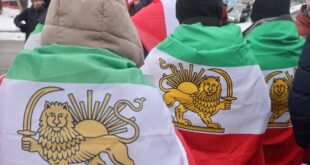DUBAI (AP) — A second US aircraft carrier strike group now steaming towards the Middle East is Washington’s way of warning Iran to back down in its attempts to dominate the region, a top US diplomat said here Tuesday.
Nicholas Burns, the US undersecretary of state for political affairs, ruled out direct US negotiations with Iran and said a rapprochement between Washington and Tehran was “not possible” until Iran halts its enrichment of uranium.
“The Middle East isn’t a region to be dominated by Iran. The Gulf  isn’t a body of water to be controlled by Iran.
That’s why we’ve seen the United States station two carrier battle groups in the region,” Burns said in an address to the Dubai-based Gulf Research Centre, an influential think tank.
“Iran is going to have to understand that the United States will protect its interests if Iran seeks to confront us,” Burns continued. “We will defend our interests if we are challenged. That might be a message Iran must understand.”
The American aircraft carrier USS John C. Stennis and several accompanying ships are heading towards the Gulf to join an aircraft carrier group already in the region, the USS Dwight D. Eisenhower. The Stennis is expected to arrive in late February.
The Stennis’ arrival in the Middle East will mark the first time since the US-led Iraq invasion in 2003 that the United States has had two carrier battle groups in the region.
The US navy said Tuesday that the minesweeper USS Gladiator arrived in the Arabian Gulf, one of six such ships — four American, two British — now plying the Gulf for anti-ship mines. US officials have long said Iran would be expected to block busy Gulf shipping lanes if there is a conflict.
Also Tuesday, Burns said the United States would announce a large aid package for Lebanon during an international conference in Paris on Wednesday. Washington’s funds are aimed at bolstering the embattled pro-US government of Lebanese President Fuad Siniora now besieged by protesters seeking his ouster.
“The United States will make a substantial contribution, a long-term financial commitment to help Lebanon rebuild itself and its economy,” he said. “They suffered through a vicious war this summer.” He said specifics of the package would be announced in Paris.
Lebanon saw more than a thousand killed and huge damage to its infrastructure and economy during a monthlong Israeli offensive that had Washington’s backing.
Burns, a polished former State Department spokesman, said he was touring America’s Gulf allies to follow up on four previous visits by Secretary of State Condoleezza Rice, who has sought the region’s support for US efforts to stabilise Iraq and contain Iran.
But the audience of Dubai-based diplomats and analysts was dismayed by Burns’ tough talk on Iran. Attendees complained that American wars in the Middle East were already threatening the region’s stability and asked him to sort out Iraq and the Israel-Palestinian conflict before turning attention to Iran.
“What we are not interested in is another war in the region,” Mohammad Naqbi, who heads the Gulf Negotiations Centre, told Burns. “Iraq is your problem, not the problem of the Arabs. You destroyed a country that had institutions. You handed that country to Iran. Now you are crying to Europe and the Arabs to help you out of this mess.” Burns’ speech appeared to respond to similar comments by Iranian officials in Dubai and Bahrain last month. In December, Iran’s top national security adviser, Ali Larijani, appealed to Gulf Arabs to shut down American bases on their soil and instead join Iran in a regional security alliance.
Burns acknowledged Washington’s Mideast problems would continue to dominate the Bush administration’s agenda. He pointed to Iran as one of four priorities, along with Iraq, Israel and Lebanon.
“In the final two years of the Bush presidency it will be the Middle East where we will focus the majority of our attention,” Burns said.
Dubai, which lies about 100 miles across the Gulf from Iran, is an ideal place to deal with Tehran, he said. The State Department last summer set up its Iran Regional Presence Office, which Burns said had already set up several cultural exchanges between the United  States  and  Iran. The office’s diplomats arranged a US wrestling team’s visit to Iran last week.
Burns said Washington would be a “willing partner” in support of civilian nuclear power programmes in its six Gulf Arab allies, saying the Bush administration supports nuclear energy as a means to combat global warming.
But the diplomat said that Iran needs to halt its uranium enrichment as a precondition for any direct discussions with Washington. Several prominent American leaders have urged the Bush administration to talk to Iran.
“It doesn’t make any sense to negotiate with Iran while their nuclear programme is ongoing,” Burns said. “There is an entry fee to the game and everybody has to pay it. You too, Iran, have to pay it.” Â
 Eurasia Press & News
Eurasia Press & News



